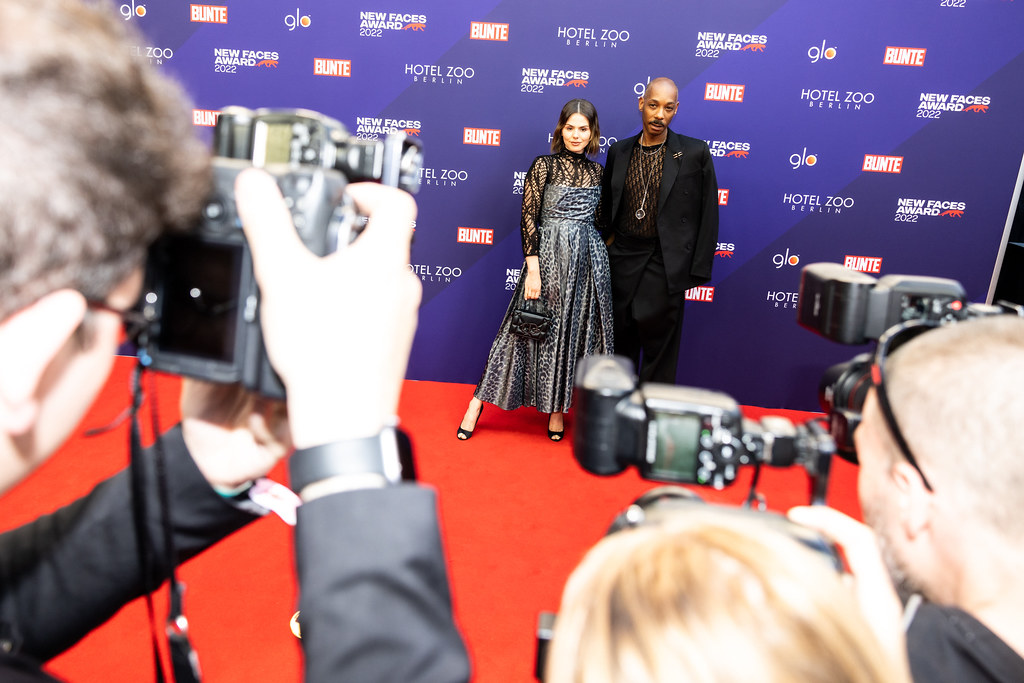
The 50th Toronto Film Festival recently concluded, marking a significant moment in the annual cinematic calendar and setting the stage for Hollywood’s impending awards season. This year, the spotlight shone brightly on Chloé Zhao’s historical drama, ‘Hamnet,’ which clinched the coveted People’s Choice Award. This win is not just a testament to the film’s compelling narrative and performances, but also a powerful indicator of its potential journey toward Academy Awards contention, given the award’s well-established track record.
Zhao’s victory with ‘Hamnet’ echoes her previous success at TIFF, where her critically acclaimed film ‘Nomadland’ also secured the People’s Choice Award in 2020 before going on to win Best Picture and Best Director at the Oscars. This repeated triumph solidifies her position as a filmmaker uniquely capable of connecting with both critics and a broad audience, underscoring the profound impact her storytelling has on the cinematic landscape. The festival, while navigating a more subdued atmosphere compared to its European counterparts like Venice and Cannes, continued its tradition of launching films into the global conversation, with audience engagement at its core.
Beyond ‘Hamnet,’ the festival celebrated a diverse array of films and filmmakers, ranging from highly anticipated genre features to impactful documentaries and insightful international dramas. The People’s Choice Awards, determined by the discerning votes of TIFF attendees, are a true reflection of public sentiment and often serve as an early barometer for films poised to capture wider acclaim. We delve into the major award recipients, exploring their significance, critical reception, and what these wins might mean for their future prospects as the awards season gathers momentum.

1. **Chloé Zhao’s ‘Hamnet’: A Repeat Triumph for an Oscar Contender**
Chloé Zhao’s ‘Hamnet’ emerged as the unequivocal winner of the top People’s Choice honor at the Toronto Film Festival, a victory that immediately placed it on an enviable track for Academy Awards contention. This deeply moving adaptation of Maggie O’Farrell’s 2020 novel offers a fictionalized account of William Shakespeare and his wife, Agnes, as they navigate love and profound loss following the death of their 11-year-old son, Hamnet. The film, starring Paul Mescal as the Bard and Jessie Buckley as Agnes Shakespeare, has garnered considerable critical praise, particularly for Buckley’s leading performance, since its debut in Telluride.
The historical significance of this award for ‘Hamnet’ cannot be overstated. Winners of TIFF’s top honor have historically almost always gone on to land a best-picture Oscar nomination, a streak that has held true every year since 2012. Zhao herself previously experienced this trajectory with ‘Nomadland’ in 2020, which not only won the People’s Choice Award but also went on to secure Best Picture and Best Director Oscars. This pattern suggests a strong, albeit not guaranteed, indicator of ‘Hamnet’s’ potential for Academy recognition, highlighting its broad appeal and emotional resonance with festival audiences.
In her acceptance speech, delivered via video link, Zhao offered a poignant reflection on her journey as a storyteller and the importance of connecting with an audience. She recalled, “I’d like to share that I was very lonely when I was young. And I wrote stories and I drew manga, and I put them on the Internet so that I could read the comments and the reactions of strangers. Whether they liked them or not, I felt connected to them, and suddenly the world is a little less of a lonely place and life seems to have more meaning.” This deeply personal insight underscores the emotional authenticity that permeates her work, explaining why her films consistently resonate deeply with viewers.
Angie Han, a film critic for The Hollywood Reporter, captured the film’s essence in her Telluride review, noting: “In Hamnet, the latest film from Oscar-winning Nomadland director Chloé Zhao, the two always go hand in hand: joy and fear, love and loss. One feeds into the other in a cycle as old as life itself, and unavoidable. But just as her William Shakespeare (Paul Mescal) turns the pain of being caught between the two into the masterpiece that is Hamlet, Zhao harnesses those elements into something gorgeous and cathartic.” This critical assessment, combined with the audience’s overwhelming approval, paints ‘Hamnet’ as a powerful and artistically significant work.
Zhao also spoke in August about working with industry titans Steven Spielberg and Sam Mendes, who produced ‘Hamnet,’ noting their filmmaker-driven feedback. She told Vanity Fair, “Their feedback was very filmmaker-driven because they are both incredible filmmakers, so when when they gave me notes, they were already infused with what they knew was my style. Even when I did things that probably were confusing or didn’t make sense to people, they would say, ‘You know what? We trust her. Let her do her thing.’” This collaboration with esteemed producers further highlights the film’s pedigree and the trust placed in Zhao’s distinctive artistic vision, setting the stage for its theatrical release on November 27 by Focus Features.

2. **Guillermo del Toro’s ‘Frankenstein’: A Thematic Runner-Up**
Securing the position of first runner-up for the top audience prize was Guillermo del Toro’s highly anticipated adaptation of Mary Shelley’s classic novel, ‘Frankenstein.’ This achievement places the film in a prominent spot, indicating a strong positive reception from TIFF attendees and signaling its potential to become a significant contender in the broader awards landscape. Del Toro, known for his visually stunning and emotionally rich storytelling, brings his unique directorial prowess to this iconic narrative, promising a fresh perspective on a timeless tale of creation and humanity.
Notably, ‘Frankenstein’ was shot mostly in and around Toronto, adding a local flavor to its production. This detail might have resonated particularly well with festival-goers, creating a sense of connection to the project. The decision to adapt such a foundational work of literature, especially by a director with del Toro’s distinct vision, always draws considerable attention, and its strong performance in the People’s Choice voting confirms that this iteration has captivated audiences and critics alike, even if not yet fully detailed in the provided context.
As a Netflix release, ‘Frankenstein’ joins a growing trend of major productions finding homes on streaming platforms, albeit still garnering significant attention at traditional film festivals. Its runner-up status suggests that despite not clinching the top prize, it struck a powerful chord with the festival audience. This positions it as a film that will undoubtedly be discussed and dissected as the industry moves further into awards season, a testament to del Toro’s enduring appeal and artistic ambition.

3. **Rian Johnson’s ‘Wake Up Dead Man: A Knives Out Mystery’: A World Premiere Hit**
The second runner-up for the coveted People’s Choice Award was Rian Johnson’s ‘Wake Up Dead Man: A Knives Out Mystery,’ which had its world premiere at TIFF. This placement confirms the enduring popularity of Johnson’s unique blend of mystery, wit, and star-studded casts, building on the success of its predecessors in the ‘Knives Out’ franchise. Audiences were clearly eager to immerse themselves in another captivating whodunit crafted by the director, showcasing his consistent ability to deliver engaging and entertaining cinema.
The fact that it was a world premiere at TIFF adds a layer of prestige and excitement to its runner-up status. Festival attendees often relish the opportunity to be among the first to witness highly anticipated films, and the enthusiasm for ‘Wake Up Dead Man’ indicates a successful launch for this latest installment. Its presence among the top audience favorites demonstrates its broad appeal, cutting across different segments of the festival-going public and reinforcing Johnson’s reputation as a master of modern mystery.
Also a Netflix release, ‘Wake Up Dead Man’ is positioned to reach a vast global audience following its festival run. The strong reception in Toronto suggests that it will likely be a major draw for subscribers and critics alike, maintaining the franchise’s momentum. This film’s performance in the People’s Choice category solidifies its standing as a commercial and critical success, poised for significant impact in the streaming landscape and beyond.

4. **Park Chan-wook’s ‘No Other Choice’: Inaugural International People’s Choice Winner**
In a significant new development for the festival, the People’s Choice Award for Best International Film was introduced this year, with the inaugural honor going to director Park Chan-wook’s ‘No Other Choice.’ This award acknowledges the growing global scope of cinema celebrated at TIFF and provides a dedicated platform for international features to receive audience recognition. Park Chan-wook, a globally acclaimed filmmaker known for his distinctive style and compelling narratives, adds another prestigious accolade to his illustrious career.
This win underscores the film’s ability to transcend cultural and linguistic barriers, resonating deeply with a diverse international audience present at the festival. Park Chan-wook’s reputation precedes him, drawing attention to his projects, and ‘No Other Choice’ clearly delivered on expectations, capturing the hearts and minds of TIFF patrons. The establishment of this new category and its first winner signals an exciting evolution in how TIFF recognizes and champions global storytelling, offering a clearer pathway for international films to gain visibility.
Securing this inaugural award firmly establishes ‘No Other Choice’ as a standout international production from the festival. The director’s masterful storytelling, combined with the film’s inherent quality, made it a clear favorite in this newly designated and highly competitive category. This recognition not only celebrates Park Chan-wook’s continued cinematic excellence but also paves the way for greater appreciation of diverse international voices in film at future TIFF editions.

5. **Matt Johnson’s ‘Nirvanna the Band the Show the Movie’: Midnight Madness Crown**
The always-exhilarating Midnight Madness section of TIFF saw Matt Johnson’s ‘Nirvanna the Band the Show the Movie’ take home the audience prize. This category is celebrated for showcasing genre films, cult classics in the making, and projects that push the boundaries of conventional storytelling, often with a distinct edge and a devoted following. Johnson’s win signifies that his film perfectly captured the adventurous and often irreverent spirit that defines the Midnight Madness experience, delivering a memorable cinematic event for late-night viewers.
The nature of Midnight Madness films often means they cultivate a passionate fan base, and the audience vote for ‘Nirvanna the Band the Show the Movie’ reflects this direct connection. These films are typically designed to be immersive, sometimes provocative, and always entertaining in their own unique way. Johnson’s ability to win over this particular segment of the TIFF audience speaks to the film’s distinctive appeal and its success in delivering the kind of exhilarating experience that Midnight Madness attendees seek.
With Obsession, directed by Curry Barker, named as the first runner-up and The Furious, from director Kenji Tanigaki, as the second runner-up, the competition within the Midnight Madness category was clearly robust. However, Matt Johnson’s film distinguished itself as the top choice, indicating its strong resonance with an audience eager for bold and unconventional cinema. This award highlights the vibrant and vital role that genre films play within the broader festival landscape.

6. **Barry Avrich’s ‘The Road Between Us’: A Controversial Documentary Win**
Barry Avrich’s ‘The Road Between Us,’ an Oct. 7, 2023-themed film, secured the People’s Choice award for Best Documentary, a victory that came amidst considerable controversy surrounding its festival presence. The film initially ignited debate at TIFF when it was invited, then disinvited, and finally reinstated by TIFF programmers, creating a significant buzz long before the awards were announced. Its eventual win by audience vote underscores a compelling public interest in its subject matter and its narrative, despite the contentious journey to its screening.
The documentary category at TIFF consistently features films that tackle pressing social, political, and cultural issues, and Avrich’s film, with its timely and sensitive theme, clearly resonated profoundly with festival attendees. The controversy surrounding its inclusion likely drew additional attention, but the audience’s decision to award it the top prize suggests that the film itself delivered a powerful and impactful viewing experience that transcended the pre-festival drama. Its subject matter, as suggested by the ‘Oct. 7, 2023-themed’ description, is undoubtedly current and emotionally charged.
This win for ‘The Road Between Us’ is a testament to the power of documentary filmmaking to spark conversation and engage audiences on critical contemporary issues. The film’s journey through TIFF, from controversy to acclaimed victory, highlights the complex interplay between artistic expression, public sentiment, and festival programming. Its success indicates a strong desire among viewers to confront and understand challenging real-world events through the lens of cinema, solidifying its place as a significant work from this year’s festival.

7. **Valentyn Vasyanovych’s ‘To The Victory!’: Platform Prize Champion**
The Platform Award, celebrating its tenth anniversary as the festival’s competitive section, was bestowed upon Valentyn Vasyanovych’s ‘To The Victory!’ This Ukrainian/Lithuanian co-production, a dark comedy about Ukraine’s post-war future, not only impressed the international jury but also featured Vasyanovych in the main character role. The Platform section is dedicated to championing bold directorial vision and distinctive storytelling, making Vasyanovych’s win a significant recognition of his artistic prowess and the film’s impactful narrative.
The Platform jury’s statement lauded ‘To The Victory!’ as the unanimous choice, highlighting its ability to bring “cinematic language to its roots” while masterfully playing with audience expectations. They noted that the film “dismantles convention to reveal deeply resonant universal emotions,” praising Vasyanovych’s “masterful precision” in choreographing the mise-en-scène. The jury also commended his deft use of comedy to address a complex situation, resulting in a work that is both “audacious and profoundly beautiful,” reminding viewers “why we are compelled to tell stories on film.”
This award carries a prize of $20,000 CAD, underscoring the festival’s commitment to supporting films that push artistic boundaries. The recognition for ‘To The Victory!’ reflects not only its cinematic excellence but also its topical relevance, offering a unique perspective on a critical contemporary issue through an innovative blend of dark comedy and profound emotional depth. The film’s success in this competitive section solidifies its standing as a powerful and thought-provoking work, resonating with critical acclaim for its mature vision and bold approach to storytelling.
Beyond the celebrated People’s Choice Awards, the Toronto Film Festival distinguishes itself through a series of juried awards, recognizing artistic excellence, emerging talent, and diverse storytelling from across the globe and within Canada. These accolades, decided by panels of esteemed industry professionals, offer a critical perspective on the films that pushed boundaries, engaged profoundly, and contributed significantly to the cinematic landscape. They highlight works that resonate not just with popular appeal, but with a deeper artistic and cultural impact.

8. **FIPRESCI Prize: Lucía Aleñar Iglesias’ ‘Forastera’**
The International Critics Prize, known as the FIPRESCI Prize, was awarded to Spanish filmmaker Lucía Aleñar Iglesias for her directorial debut, ‘Forastera.’ This prestigious award, dedicated to emerging filmmakers, recognized the film for its compelling narrative and distinctive artistic voice, premiering in TIFF’s Discovery or Centrepiece programs. The FIPRESCI jury, composed of international critics, sought out a debut feature that demonstrated unique vision and lasting impact.
The FIPRESCI jury’s statement lauded Iglesias for forging “a new distinctive voice” in Spanish cinema, moving beyond the traditional exuberance often associated with the region. Set against the sun-drenched backdrop of Mallorca, ‘Forastera’ follows 16-year-old Cata whose family holiday takes a poignant turn with the death of her grandmother. The narrative delicately explores the teenager’s grief as she begins to adopt her grandmother’s persona, encompassing her clothes, gestures, and silences.
Iglesias’ direction was particularly commended for its restraint and precision, finding profound power in understatement. The jury noted the compelling performances from newcomer Zoe Stein and veteran Lluís Homar, which anchored the film’s “dreamlike rhythms.” They described ‘Forastera’ as a luminous meditation on an adolescent’s first encounter with death and a compelling ghost story that explores how the past inevitably lingers in the present, marking Iglesias as a filmmaker of significant promise.
The critical recognition from FIPRESCI not only celebrates ‘Forastera’ as a “quietly assured debut” but also positions Lucía Aleñar Iglesias as an important emerging talent. The jury’s collective sentiment was to “bet on” her future, indicating a strong belief in her sustained artistic contributions. This award reinforces TIFF’s role in identifying and elevating distinctive voices within the global film community.

9. **NETPAC Award: Jitank Singh Gurjar’s ‘In Search of the Sky (Vimukt)’**
The NETPAC Award, presented by the Network for the Promotion of Asian Pacific Cinema, recognized Jitank Singh Gurjar for his second feature film, ‘In Search of the Sky (Vimukt).’ This award specifically honors the best Asian film by a first or second-time feature director, underscoring TIFF’s commitment to fostering and celebrating cinematic talent from the Asian and Pacific regions. Gurjar’s film stood out for its unique blend of realism and poetic storytelling.
The NETPAC jury praised ‘In Search of the Sky’ for delivering an “indelible tale of tolerance, desperation and faith,” conveyed through a distinctive cinematic lens. They highlighted the film’s striking performances and its status as a “truly independent achievement” by the Indian filmmaker. This recognition speaks to the film’s capacity to tell a powerful story with limited resources, showcasing a raw and authentic vision.
The film transports its audience to rural central India, immersing them in the challenging lives of an impoverished elderly couple. They contend with the daily struggles of caring for their cognitively challenged adult son, all while facing threats to their existence from hostile villagers. A poignant beacon of hope emerges through their pilgrimage to the Maha Kumbh Mela, the world’s largest spiritual gathering, where they seek renewal and new possibilities for life.
Jitank Singh Gurjar’s achievement with ‘In Search of the Sky’ reflects the vital role of independent cinema in bringing diverse, culturally rich narratives to the forefront. The NETPAC Award not only celebrates the film’s artistic merits but also its profound ability to explore universal themes of resilience, faith, and the human spirit against a specific cultural backdrop, offering an enriching perspective for international audiences.

10. **Best Canadian Discovery Award: Sophy Romvari’s ‘Blue Heron’**
The Best Canadian Discovery Award, a testament to TIFF’s dedication to nurturing homegrown talent, was presented to Sophy Romvari for her film ‘Blue Heron.’ This award celebrates emerging filmmakers who significantly enrich the Canadian film landscape, and first or second feature films in the Official Selection are eligible. Romvari’s win included a cash prize of $10,000 CAD, providing crucial support for her artistic endeavors.
The jury for this award highlighted how ‘Blue Heron,’ both written and directed by Romvari, masterfully integrated all its elements—script, direction, cinematography, performance, and editing—to create a powerful and cohesive work that transcended the sum of its parts. They particularly noted the film’s understated simplicity in conveying a complex story, rich with perspective and emotion, without any superfluous detail.
‘Blue Heron’ delves into the deeply personal narrative of a family grappling with a troubling crisis. The film intricately weaves themes of love, grief, memory, and the universal yearning to return to “the moment before everything changed.” Its transitions between real and imagined, past and present, were deemed seamless and heartbreaking, showcasing Romvari’s sensitive and assured approach to storytelling. The film had previously garnered recognition at the Locarno prize, further solidifying its critical acclaim.
In her acceptance speech, Romvari offered a powerful statement on the film’s contemporary relevance, acknowledging “the ongoing genocide in Palestine.” This dedication underscored the film’s capacity to connect personal narratives with broader global issues, reflecting the jury’s earlier observation that the strength of Indigenous films and the overall variety of Canadian storytelling were powerful indicators for the future of cinema in the country.

11. **Best Canadian Feature Film Award: Zacharias Kunuk’s ‘Uiksaringitara (Wrong Husband)’**
Recognizing the unique craft and storytelling within Canadian cinema, the Best Canadian Feature Film Award was bestowed upon Zacharias Kunuk’s Inuk historical drama, ‘Uiksaringitara (Wrong Husband).’ This award is designated for Canadian feature films in the Official Selection, specifically those beyond a director’s first or second feature, and comes with a $10,000 CAD cash prize. The film had its North American premiere at TIFF, drawing significant attention to its compelling narrative rooted in Inuit history.
The jury’s statement lauded ‘Wrong Husband’ as a “love story from thousands of years ago” that skillfully blends the epic and intimate, creating a mesmerizing and unique cinematic experience. The film immerses viewers in the exquisite details of daily rhythms of ancient Inuit life, where the supernatural is not only ever-present but presented with a matter-of-fact naturalness, seamlessly integrated into the historical setting.
The interactions between the characters were particularly praised for their “humour, gentleness and stoicism,” which collectively evoked deep emotional resonance. Furthermore, the jury highlighted the Arctic landscape’s pivotal role, describing it as both a sublime setting and a character in itself, actively shaping the narrative and emotional texture of the film. This recognition underscored Kunuk’s established reputation as a “master storyteller,” building on a legacy of compelling Indigenous narratives.
‘Uiksaringitara (Wrong Husband)’ stands as a significant achievement in Canadian filmmaking, offering a window into a rich cultural heritage through a visually stunning and emotionally profound lens. The award celebrates Kunuk’s mature vision and his ability to translate ancient stories into a contemporary cinematic language, reinforcing the powerful contributions of Indigenous filmmakers to the national and international film landscape.

12. **Short Cuts Award for Best International Short Film: Joecar Hanna’s ‘Talk Me’**
In the highly competitive Short Cuts section, Joecar Hanna’s ‘Talk Me’ earned the Award for Best International Short Film. This accolade celebrates outstanding short-form narratives from around the world and comes with a bursary of $10,000 CAD, providing valuable support for the filmmakers. Executive produced by the esteemed Spike Lee, ‘Talk Me’ arrived at TIFF with considerable anticipation following its debut at Cannes.
The Short Cuts jury’s statement reflected on the engaging discussions the film sparked, emphasizing ‘Talk Me’s’ bold portrayal of intimacy and its exploration of the universal human longing for connection. The jury was particularly impressed by how naturally the characters fit into the film’s “unique, evocative world,” making everything feel normal very quickly, despite the sensitive subject matter.
The cinematography of ‘Talk Me’ was lauded as “beautiful, delicate yet deliberate,” with each frame meticulously crafted to draw viewers deeper into the story. By allowing the visuals to lead, the film creates an immersive experience of vulnerability and honesty, engaging the audience on a profound emotional level. The jury presented the award to Joecar Hanna’s ‘Talk Me’ for its exceptional “courage, craft, and sensitivity,” recognizing its significant artistic achievement.

13. **Short Cuts Award for Best Canadian Short Film: Chris Lavis & Maciek Szczerbowski’s ‘The Girl Who Cried Pearls’**
The Short Cuts Award for Best Canadian Short Film was presented to ‘The Girl Who Cried Pearls,’ a stop-motion animated film from the acclaimed Oscar-nominated Canadian filmmakers Chris Lavis and Maciek Szczerbowski. This award celebrates the distinctive narrative and artistic contributions within Canadian short filmmaking, recognizing the unique creative voices that enrich the national cinema. The project received backing from the National Film Board of Canada, a testament to its artistic merit and production quality.
The Short Cuts jury lauded the film not only for its “daring technical achievement and sumptuous artistic direction” but also for its profound narrative depth. They described ‘The Girl Who Cried Pearls’ as a fable that ingeniously explores themes of greed and celebrates the extraordinary capacity of artists to conjure fantastic worlds through the sheer power of their narrative voice.
Lavis and Szczerbowski, known for their innovative animation techniques and evocative storytelling, delivered a film that captivated the jury with its intricate craftsmanship and imaginative scope. The award acknowledges their continued excellence in the animation field and their ability to craft a story that is both visually stunning and rich in metaphorical meaning, solidifying its place as a standout Canadian short.

14. **Short Cuts Award for Best Animated Short Film: Agnès Patron’s ‘To The Woods’**
Agnès Patron’s French production, ‘To The Woods,’ was honored with the Short Cuts Award for Best Animated Short Film, following its North American premiere at TIFF. This category specifically recognizes the innovative artistry and storytelling prowess in animation, and like other Short Cuts awards, it included a $10,000 CAD bursary for the filmmaker.
The jury’s statement praised ‘To The Woods’ as a “wordless journey into the bond between two siblings” that transforms into a “transcendent meditation on the mysteries of time and memory, love and loss, connection and transformation.” The film’s narrative power, conveyed without dialogue, deeply resonated with the jurors, highlighting its universal emotional appeal and artistic depth.
Patron’s film was celebrated for its “lush, cosmic beauty” in animation, vibrating with tenderness and insight. The jury remarked on its “overwhelming artistry, luminous spirit, and soul-expanding sense of mystery,” acknowledging the film’s immersive quality. Special commendation was given to the jaw-dropping sound design and the exquisite work of composer Pierre Oberkampf, whose score was recognized as among the best film music of recent years.
In a poignant moment during her acceptance, Agnès Patron dedicated her award to “all the children in this world who see the sky darkening above their heads, filling their eyes and hearts with rage and fear instead of love and poetry.” This dedication underscored the film’s profound emotional resonance and its ability to connect with contemporary global sentiments, further amplifying its significance beyond its artistic achievements.
As the curtains fall on another remarkable edition of the Toronto Film Festival, the blend of audience-driven enthusiasm and critical recognition through its diverse awards paints a vivid picture of the global cinematic landscape. From Chloé Zhao’s anticipated Oscar contender ‘Hamnet’ to the compelling narratives of emerging talents recognized in the juried categories, TIFF continues to be a vital platform for showcasing, celebrating, and shaping the future of film. The festival’s commitment to varied storytelling, artistic innovation, and critical dialogue ensures that it remains a cornerstone event for both industry insiders and passionate cinephiles, setting the stage for discussions and discoveries that resonate long after the final credits roll.


